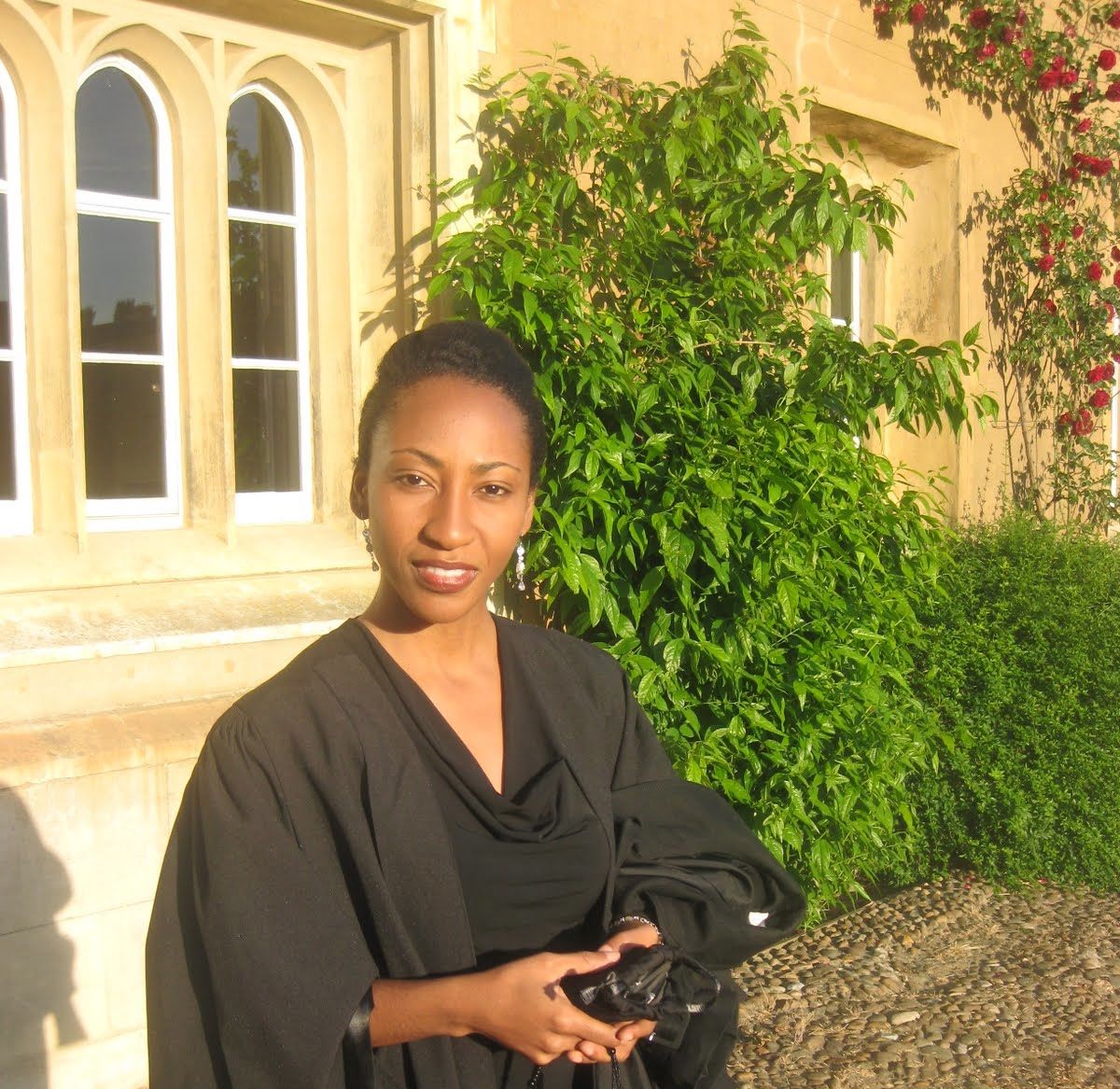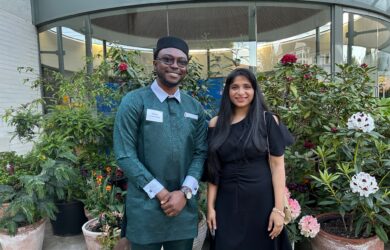
Queen Nworisara Quinn on creating spaces where different sectors can collaborate in the interests of African innovation and enterprise.
At Kupanda Capital we see ourselves as entrepreneurs and business builders. We co-create with entrepreneurs, cultivate high performing teams and scale up pan-African companies. It’s very collaborative and not just about deploying capital. We are focused on how to build sustainable businesses in Africa.
Queen Nworisara Quinn
During her time at Cambridge, Queen Nworisara Quinn co-founded the Cambridge Africa Business Network, a yearly conference focused on Africa which brought academics and practitioners together as well as politicians such as Olusegun Obasanjo, the former president of Nigeria. It was a huge achievement and one that exemplifies her commitment to creating spaces where different sectors can collaborate in the interests of African innovation and enterprise.
She says: “I feel really proud of what we achieved. It’s important to create networks between academics and practitioners in Africa and students and practitioners in the UK. The network aims to promote more entrepreneurs and research focused on Africa.”
The first conference took place in the spring of 2012 and the following year Queen advised MBA students to run it, helped find speakers and was a speaker on one of the panels. It built on her experience at the African Development Bank and has stood her in good stead for her present job as co-founder of Kupanda Capital, an organisation which creates and scales innovative business ideas.
Early years and studies
Queen [2011] has always had a broad world view. Born in Nigeria, her family moved to the US after her father received a scholarship to study engineering. Queen attended elementary and secondary school in Orlando, Florida, but in her last two years of high school her family moved to Pennsylvania. Although she was a good all-round student, she developed a particular interest in political history, inspired by a particularly good teacher. She attended Advanced Placement classes in history and was drawn to international relations. “Being born outside the US meant I had a bigger world view. I was interested in what was going on geopolitically, especially on the Africa continent,” she says.
When she started university at Penn State, Queen wasn’t initially sure what she would major in. While she loved politics and international relations, her parents favoured medicine, engineering or law. She benefited from a good teacher, Professor Michael Berkman, Director of the McCourtney Institute for Democracy, who had a big influence on her early academic career. While she was at Penn State she took part in the Fund for American Studies economics and political science programme. That included being placed in an internship at BAMPAC, Black America’s Political Action Committee, in Washington DC. The organisation supported fiscally conservative policies and African-American candidates. The experience taught Queen a lot about how the government works and got her thinking more about public policy.
After graduating in 2001 and marrying her husband Matthew the following year, Queen moved to Washington DC and worked as a programme officer for the Fund for American Studies, managing its international programme which involved bringing students together to study conflict management and political economy courses.
Master's course
Two years later, with the advice of Professor Berkman, she applied to the John F. Kennedy School of Government at Harvard University to do a master’s in Public Policy, with a concentration on International Trade and Finance to give herself experience in both the practical and theoretical issues around public policy making. She describes the experience as “transformative”. “It shaped the direction of my professional life,” she says. The first year focused on economics and Queen became interested in social enterprise and social entrepreneurship which covered the public, private and non-profit sectors. Queen spent half her first summer in Nigeria working for Partners for Development, evaluating microfinance and health programmes. For the other half she interned at the African Development Bank working in the risk management and the private sector departments. It was her first exposure to working in a financial institution. The experience led her to start exploring the idea of working in banking.
Later that autumn, during the final year of her master’s programme, she attended a Citigroup event and met the head of global recruiting there. She spoke about her work at the African Development Bank and the Citi recruiter asked for her cv. It was serendipity, but Queen was ready to get the training she needed. She joined Citi’s management associate programme in New York and stayed at the firm for two years. The experience gave her a good grounding in the financial sector, but she eventually wanted to do something that was more Africa-focused. She applied to the young professionals programme at the African Development Bank and moved to Tunis.
African Development Bank
Colleagues said she was taking a risk as she was in line for promotion, but it turned out to be very prescient timing. It was 2008 and the global recession was just about to set in. “It was a wonderful time to be at the African Development Bank (AfDB). Due to the credit freeze, lots of companies could not get capital from private banks. The African Development Bank was able to provide much needed capital. As an investment officer, I worked on a lot of transactions. It was a tremendous experience. We worked on private and public projects across Africa which had a huge impact,” says Queen. She also became interested in the newly evolving space of impact investing whereby private capital investments are made to generate a social and/or environmental impact. She decided she needed some time to reflect on what she had learned and to get a wider perspective on it.
Queen met two Gates Cambridge Scholars at the African Development Bank and looked into applying for an MPhil with a view to continuing on towards a PhD. She contacted Professor Michael Barrett at Cambridge University’s Judge Business School who encouraged her to apply. She only applied to Cambridge and to Christ's College and says that the Gates Cambridge scholarship made it easier to continue her studies, especially given the decision to leave a job she really enjoyed. Her MPhil was in Innovation, Strategy and Organisation and was followed by a PhD in Management Studies which focused on the emergence of impact investing and the flow of capital towards frontier African markets. Her dissertation was supervised by Dr Kamal Munir, Reader in Strategy & Policy at the Judge Business School.
Kupanda Capital
On completing her PhD, Queen started working at Kupanda Capital full time. Kupanda Capital is an investment platform she co-founded with her former colleagues from the African Development Bank, Bobby Pittman and Linda Oramasionwu. The organisation creates, capitalises and scales new investment opportunities focused on Africa. One of the firms it is has created is Fraym, a geospatial data analytics company which improves decision-making for development finance institutions, corporates and US government agencies operating in Africa. Queen serves as a member of the board. “At Kupanda Capital we see ourselves as entrepreneurs and business builders. We co-create with entrepreneurs, cultivate high performing teams and scale up pan-African companies. It’s very collaborative and not just about deploying capital. We are focused on how to build sustainable businesses in Africa,” she says.
Queen is also on the board of OXOSI, a design-centred platform for African brands and designers who want to reach a global market. In addition to its investment work, Kupanda Capital partners with the African Leadership Academy (ALA) in South Africa to recruit new associates from within the ALA network of talented young African leaders. Queen has also connected ALA staff to the Gates Cambridge staff in order to encourage ALA students to do further studies abroad through a Gates Cambridge Scholarship and to get the experience they need to progress in their careers. “These are some of the most talented people on the planet,” she says.
Queen says she feels like she has come full circle through this work. She says: “Everything I have been able to accomplish professionally is due in larger part to my access to education. It has transformed my life. Working at Kupanda Capital is one of the best ways to leverage all the opportunities that have been given to me, including Gates Cambridge which has inspired me to help others.”
Queen Nworisara Quinn
- Alumni
- United States
- 2010 MPhil Innovation, Strategy and Organisation
2011 PhD Management Studies - Christ's College
I completed my PhD in Management Studies at the Judge Business School after completing my MPhil in innovation, strategy & organizational behavior. My research focused on the emergence of social impact investing in frontier African markets and how perceptions influence the flow of capital towards these markets. I hope to develop research which helps to improve access to capital for African firms and entrepreneurs. I also aspire to teach students about entrepreneurship and hope that my research would prove beneficial in educating a new class of investors about investment opportunities in Africa.
Previous Education
University of Cambridge MPhil in Innovation, Strategy and Organisation 2010
Penn State University BA
Harvard University












